Walt Whitman(1819-1892)
美国作家简介
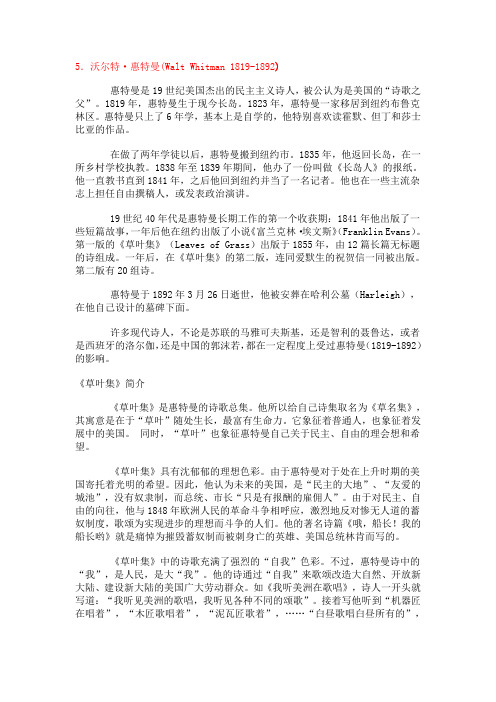
5.沃尔特·惠特曼(Walt Whitman 1819-1892)惠特曼是19世纪美国杰出的民主主义诗人,被公认为是美国的“诗歌之父”。
1819年,惠特曼生于现今长岛。
1823年,惠特曼一家移居到纽约布鲁克林区。
惠特曼只上了6年学,基本上是自学的,他特别喜欢读霍默、但丁和莎士比亚的作品。
在做了两年学徒以后,惠特曼搬到纽约市。
1835年,他返回长岛,在一所乡村学校执教。
1838年至1839年期间,他办了一份叫做《长岛人》的报纸。
他一直教书直到1841年,之后他回到纽约并当了一名记者。
他也在一些主流杂志上担任自由撰稿人,或发表政治演讲。
19世纪40年代是惠特曼长期工作的第一个收获期:1841年他出版了一些短篇故事,一年后他在纽约出版了小说《富兰克林·埃文斯》(Franklin Evans)。
第一版的《草叶集》(Leaves of Grass)出版于1855年,由12篇长篇无标题的诗组成。
一年后,在《草叶集》的第二版,连同爱默生的祝贺信一同被出版。
第二版有20组诗。
惠特曼于1892年3月26日逝世,他被安葬在哈利公墓(Harleigh),在他自己设计的墓碑下面。
许多现代诗人,不论是苏联的马雅可夫斯基,还是智利的聂鲁达,或者是西班牙的洛尔伽,还是中国的郭沫若,都在一定程度上受过惠特曼(1819-1892)的影响。
《草叶集》简介《草叶集》是惠特曼的诗歌总集。
他所以给自己诗集取名为《草名集》,其寓意是在于“草叶”随处生长,最富有生命力。
它象征着普通人,也象征着发展中的美国。
同时,“草叶”也象征惠特曼自己关于民主、自由的理会想和希望。
《草叶集》具有沈郁郁的理想色彩。
由于惠特曼对于处在上升时期的美国寄托着光明的希望。
因此,他认为未来的美国,是“民主的大地”、“友爱的城池”,没有奴隶制,而总统、市长“只是有报酬的雇佣人”。
由于对民主、自由的向往,他与1848年欧洲人民的革命斗争相呼应,激烈地反对惨无人道的蓄奴制度,歌颂为实现进步的理想而斗争的人们。
Walt Whitman
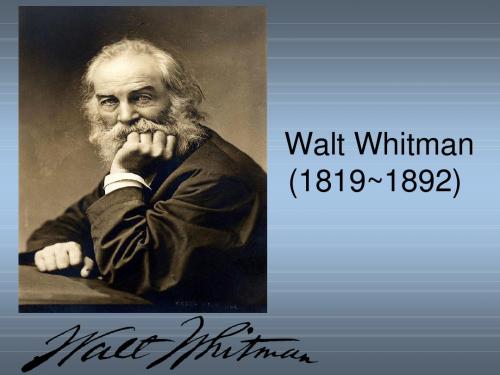
Thank you
poems in the collection
• • • • songs of myself 自我之歌 I Sit and Look Out 坐观世间 O Captain, My Captain 船长,我的船长 I Hear America Singing我听见美洲在歌唱 ......
Writting
Life and work
• 1841: moved to New York • 1855: the first edition of Leaves of Grass published • 1865:President Lincoln was assassinated, War poetry Drum-Taps published. • 1882:Met with Oscar Wilde, Specimen Days and Collect was published.
Walt Whitman (1819~1892)
Brief Introduction
• an American poet, essayist,journalist, a humanist, he was a part of the transition between transcendentalism(超验主义) and realism.(现实主义) • the father of free verse(自由诗之父).His work was very controversial in its time, particularly his poetry collection Leaves of Grass(草叶集)
Whitman's work breaks the boundaries of poetic form and is generally prose-like(散文 诗的)
惠特曼
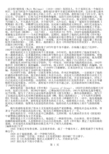
惠特曼的名字,中国人民是早已熟悉的。五四时期,诗人郭沫若在名诗《匪徒颂》中就赞扬过惠特曼为文艺革命家。
惠特曼是土生土长的美国诗人,他创造了一种新型诗体:自由体诗。即不受格律、韵脚的限制和束缚,人思想和语言自由自在的发挥,诗作《草叶集》奠定了美国诗歌的基础,并对美国及其他国家的诗歌艺术产生了相当大的影响。
1847 在美国和加拿大徒步旅行。春天,在报纸上发表一篇题为《美国工人反对奴隶制度》的论文。开始了后 来编入《草叶集》诗篇的写作。
1848 1月,被《每日鹰报》解雇。
1849 “自有土壤派”在布鲁克林办起了自己的机关报《布鲁克林自由人》,惠特曼成了该报的编辑。秋天,因“自由土壤派”领导人的变节,愤然辞职,并在9月11日《布鲁克林自由人》上刊登声明。
惠特曼的第一部诗集是《草叶集》(Leaves of Grass),1855年在纽约出版时只有94项,包括12首诗作,到1882年版时,已增加到372首诗作;1861年美国南北战争爆发,这个时期,他写下了真实记录这场革命战争的《鼓专用集》;林肯总统被刺后,他写下了沉痛表达美国人民对林肯被刺而哀思的《啊,船长!我的船长》、《今天的军营静悄悄》等诗篇,表示了对林肯的沉痛哀悼;在有名的《神秘的号手》一诗中,他乐观地描绘了未来的自由世界。惠特曼是美国著名的民主诗人,他歌颂民主自由,体现了美国人民对民主的渴望,他赞美人民创造性的劳动,他的诗给人以积极向上的生气勃勃的精神。
在一个伟大事业开头的时候,为了这样良好的开端,我恭贺您。这个开端将来一定会有广阔的前景。我揉揉眼睛,想看看这道阳光是不是幻觉;但是这本书给我的实感又是明确无疑的。它的最大优点就是加强和鼓舞人们的信心。
Whitman
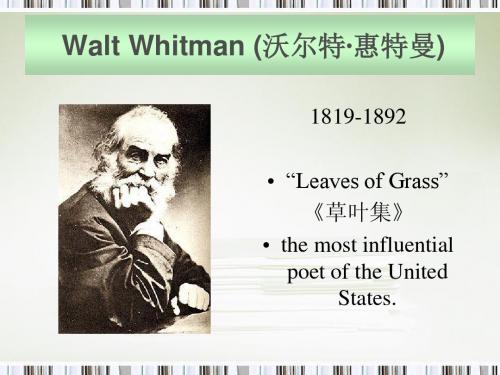
His Life
• a school teacher, an apprentice to a printer, and the editor of various newspapers. • little education but read a great deal • In 1855 his first edition of Leaves of Grass was published. (In the rest of his life, he continued to add new poems to the collection until his death in 1892. )
Style and Language
• a. The use of the poetic "I". Speaking in the voice of "I", Whitman becomes all those people in his poems. • b. Free verse. A looser and more open-ended syntactical structure without a fixed beat or regular rhyme scheme. • c. The use of parallelism and phonetic recurrence. • d. The use of colorful words and vivid images.
Walt Whitman (沃尔特 惠特曼 沃尔特·惠特曼 沃尔特 惠特曼)
1819-1892 • “Leaves of Grass” 《草叶集》 • the most influential poet of the United States.
Walt Whitman
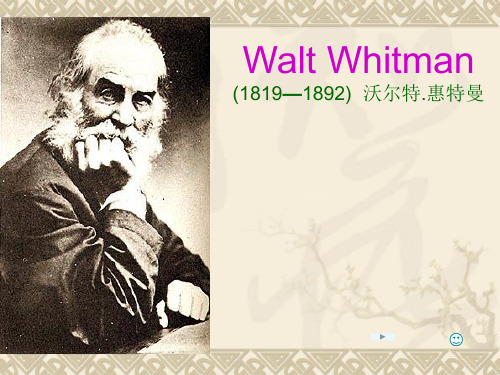
"Song of Myself"
我赞美我自己,歌唱我自己, 我承担的你也将承担, 因为属于我的每一个原子也同样属于你。
我闲步,还邀请了我的灵魂, 我俯身悠然观察着一片夏日的草叶。 我的舌,我血液的每个原子,是在这片土壤、这个空气里形成的, 是这里的父母生下的,父母的父母也是在这里生下的, 他们的父母也一样, 我,现在三十七岁,一生下身体就十分健康, 希望永远如此,直到死去。 信条和学派暂时不论, 且后退一步,明了它们当前的情况已足,但也决不是忘记, 不论我从善从恶,我允许随意发表意见, 顺乎自然,保持原始的活力。
His Life
During
the Civil War, Whitman worked as a volunteer nurse, a “wound dresser” in military hospitals.
Drum
Taps (1865)
His Works
Leaves
of Grass 《草叶集》 — nine editions Drum Taps (1865) 《桴鼓集》 —about civil war “Song of Myself” & “I Hear America Singing” “O, Captain! My Captain!” & “I Sit and Look Out”
What does the title mean?
草叶:随处生长,最富有生命力。
1、象征普通人;
2、象征发展中的美国;
3、象征自己关于民主、自由的理想和希望。
Theme
In
this giant work, openness, freedom, and above all, individualism are all that concerned him.
沃尔特·惠特曼 Walt Whitman 美国文学史

• Equivalence of body and soul and the unabashed(不 加掩饰的) excitement of the body and sexuality.
Over the next 37 years, it appeared in nine editions altogether.
Drum-Taps(1865) --《桴鼓集》 collected into Leaves of Grass
When Lilacs Last in the Dooryard Bloom (1865) --《最近紫丁香在庭 院里开放的时候》
Creeds and schools in abeyance, 教条和学派先放一旁,
Retiring back a while sufficed at what they are,but never forgotten, 让他们暂且后退,满足于现状,但不被遗忘,
I harbor for good or bad,I permit to speak at every hazard, 我心怀善与恶,我要不顾一切地述说,
When he was sixteen, he worked as a teacher in the one-room school houses of Long Island.
He continued teaching until 1841, then turning to journalism as a full-time career at the age of twenty-two.
美国文学_walt_whitman_简介
Major Themes in His Poetry
• • • • • • • Equality of things and beings Divinity of everything Multiplicity of nature Self-reliant spirit Death, beauty of death Expansion of America Brotherhood and social solidarity (unity of nations in the world) • Pursuit of love and happiness
Leaves of Grass 草叶集
First published in 1855 with only 12 poems Nine editions and last edition includes more than 400 poems Celebrates the ideals of equality, democracy, the dignity, selfreliant spirit and joy of common people Grass---the most common thing with the greatest vitality, as a symbol of the rising American
O Captain! My Captain
Captain! my Captain! our fearful trip is done, The ship has weather'd every rack, the prize we sought is worn, The port is near, the bells I hear, the people all exulting, While follow eyes the steady keel, the vessel grim and daring; But O heart! heart! heart! O the bleeding drops of red! Where on the deck my Captain lies, Fallen cold and dead. O Captain! my Captain! rise up and hear the bells; Rise up--for you the flag is flung--for you the bugle trills, For you bouquets and ribbon'd wreaths--for you the shores crowding, For you they call, the swaying mass, their eager faces turning; Here, Captain! dear father! This arm beneath your head; It is some dream that on the deck You've fallen cold and dead. My Captain does not answer, his lips are pale and still, My father does not feel my arm, he has no pulse or will; The ship is anchor'd safe and sound, its voyage closed and done; From fearful trip the victor ship comes in with object won; Exult, O Shores! and ring, O bell! But I, with mournful tread, Walk the deck my Captain lies, Fallen cold and dead.
英语诗歌
Walt Whitman(1819~1892)
introduction
1.Born on May 31, 1819, the second son of a house-builder 出世于1819年5月31日,一个建筑家的二儿子 rgely self-taught, acquainted with the works of Homer, Dante, Shakespeare, and the Bible. 主要是自学成才,熟悉荷马,但丁,莎士比亚的作品,和圣经 3.In 1836, as a teacher in the one-room school houses of Long Island 1836,在一间学校的房子是长岛的一个老师 4.Continuing to teach until 1841, then turning to journalism as a full-time career. 继续教到1841,然后把新闻作为一个全职的职业 5.In the fall of 1848, he founded a “free soil” newspaper, the Brooklyn Freeman. 在1848的秋天,他成立了一个“自由之土”的报纸,布鲁克林弗
I celebrate myself, and sing myself, And what I assห้องสมุดไป่ตู้me you shall assume, For every atom belonging to me as good belongs to you. I loafe and invite my soul, I lean and loafe at my ease observing a spear of summer grass. My tongue, every atom of my blood, form'd from this soil, this air, Born here of parents born here from parents the same, and their parents the same,
waltman著名美国诗人
Leaves of Grass 《草叶集》 1855 Song of Myself 《自我之歌》 Song of the Broad-Axe 《阔斧之歌》 1856 I Hear America Singing 《我听见美洲在歌唱》 1860 When Lilacs Last in the Dooryard Bloom`d《小院丁香花开时》 1865-1866
1862, Clerk at Secretary of the Interior内 政部 1865. 1 January. Becomes a clerk at the Bureau of Indian Affairs, a post he enjoys. Fired in May because Secretary of the Interior James Harlan sees Leaves of Grass in Whitman‘s desk drawer and denounces it as immoral(不道德的).
•“I find [Leaves of Grass] the most extraordinary piece of wit & wisdom that America has yet contributed. . . . I greet you at the beginning of a great career, which yet must have had a long foreground前景 somewhere, for such a start.”
Leaves of Grass, 1867
Added 8 new poems Incorporates(收入) ―Drum-Taps”《桴鼓集》 (1865), and Sequel(续集) to Drum-Taps, including “When Lilacs Last in the Dooryard Bloom’d 《最近紫丁香在庭院里开放的时候》 “O Captain, My Captain” 《啊,船长,我的船长》.
惠特曼
我听见美国在歌唱
我听见美国在歌唱,我听见各种各样的歌, 那些机械工人的歌,每个人都唱着他那理所当然地快乐而又 雄伟的歌, 木匠一面衡量着他的木板或房梁,一面唱着他的歌, 泥水匠在准备开始工作或离开工作的时候唱着他的歌, 船夫在他的船上唱着属于他的歌,舱面水手在汽船甲板上唱 歌, 鞋匠坐在他的凳子上唱歌,做帽子的人站着唱歌, 伐木者的砍,牵引耕畜的孩子在早晨、午休或日落时走在路 上唱的歌,
草叶集
《草叶集》是惠特曼一生创作的唯一一部诗集, 是他一生经验的结晶。整部诗集是一个独立的有 机体,它随着诗人的成长而成长,随着合众国的 发展而发展。诗集的篇幅从首版的14首,增加到 临终版的近400首为止。
《草叶集》既是惠特曼自我心灵发展的史诗,又 是美利坚民族发展、成长的史诗。 《草叶集》涉及的领域十分广泛,思想十分丰 富、庞杂,但其基本的主题可大致归结为:自我、 创造和民主。
1830年,开始自谋生路,在一个小单位当 小职员。 1832年,转到长岛到《爱国者》报社当记 者,后来又当了印刷工人。 此后,他一面在长岛的几所乡村小学教书, 一面给当地的报纸写稿。
1838年,他在亨廷顿办了一份周报《长岛人》。 1839年,他又成为长岛《民主论坛》的撰稿人。 此后的几年中,他先后在纽约的几家报社如《奥罗 拉》、《闲谈》、《民主论坛》等担任记者和编辑。
1846年,他成为布鲁克林《鹰》报的编辑, 此时它已在新闻界同行中颇有声望。 1848年,或许是出于冒险的目的,他离开 了纽约到新奥尔良《新月报》,在新奥尔 良的时候,他亲眼目睹了奴隶拍卖——当 时很普遍的事情。这时,惠特曼开始着力 写诗。
“这是一种感情或野心,想要以文学诗 歌的形式,把处在这个时代以及现代 美国的重要事实,我自己的肉体、情 感、道德、思想以及美感上的个性忠 实地表露出来”。
- 1、下载文档前请自行甄别文档内容的完整性,平台不提供额外的编辑、内容补充、找答案等附加服务。
- 2、"仅部分预览"的文档,不可在线预览部分如存在完整性等问题,可反馈申请退款(可完整预览的文档不适用该条件!)。
- 3、如文档侵犯您的权益,请联系客服反馈,我们会尽快为您处理(人工客服工作时间:9:00-18:30)。
•ห้องสมุดไป่ตู้
……
•
打开大门上的锁/从门柱上撬开大 门/……通过我而发出被禁制的呼声:/ 性的和肉欲的呼声……/我认为欢媾并不 比死更粗恶,/我赞赏食欲和色欲,/视觉、 听觉、感觉都是神奇的。
——《自己之歌》(《Song of Myself》)
•
诗人把自己描绘成 所有人中的一个。 • 这个人是超群的, 又是普通的;有优点, 也有毛病,甚至道德 并不完美。 • 就象一棵大树上一 片普通的叶子,一个 草原上的一株普通的 小草。
• Song of Myself 自我之歌(我 自己的歌) • I Sit and Look Out 我坐在这儿 眺望着 • I hear America Singing 我听见 美国在歌唱 • O Captain! My Captain! 船长! 我的船长! • Beat! Beat! Drums! 敲吧 战鼓! • Democratic Vistas 民主的前景 • The Tramp and Strike Question 流浪汉和罢工问题
•
Major Themes in His Poetry
• Equality of things and beings • Divinity of everything • Multiplicity of nature • Self-reliant spirit • Death, beauty of death • Expansion of America • Brotherhood and social solidarity (unity of nations in the world) • Pursuit of love and happiness
Free Verse: 自由诗
• 按照语言的抑扬顿挫和形象模式,而不是 按照固定韵律写出的诗。它的韵律建立在 短语、句子和段落上,而不是建立在音步、 诗行和诗节等传统格律单位上。“自由诗” 这个词泛指惠特曼的诗歌。20世纪初,在 英美诗坛中自由诗已经开始流行。
我“充满了粗糙的东西,也同样充满 了精致的东西”
Works
• 1855年7月,美国诗歌 史上的第一声春雷炸 响了——惠特曼出版 了《草叶集》。《草 叶集》第一版只有薄 薄的94页,包括12首 诗作。1891年惠特曼 逝世前,《草叶集》 已出版了第九版,其 中的诗歌篇目已增加 到372首。
Leaves of Grass (9 editions)
Walt Whitman’s Contribution
• He believes the American poets would create both new forms and new subjects matter(主题) for poetry. • In terms of poetic form, he advocated a completely new and completely American form of expression----free verse. • In terms of contents, most of his poems are about man and nature, especially common people and ordinary Americans. He wanted his poetry to be for(赞成) the common people
诗集名的由来
• 诗集得名于其中这样的一句诗:“哪里有 土,哪里有水,哪里就长着草。” • 草叶:随处生长,最富有生命力。 • 1、象征普通人 • 2、象征发展中的美国 • 3、象征自己关于民主、自由的理想和希望
《草叶集》的地位
• 《草叶集》从第一版 到第九版,经历了坎 坷的历程,其中充满 了激烈的争论。这种 争论在诗人逝世后100 多年的时间里仍然在 延续。19世纪后叶至 20世纪全世界所有文 学大师几乎无一例外 地都在一生中的某个 时刻向惠特曼的《草 叶集》行过注目礼。
Whitman’s birthplace
• In the fall of 1848, he founded a “free soil” newspaper. • In 1855, first edition of Leaves of Grass, which consisted of twelve untitled poems and a preface(序言). • Second edition in 1856 (thirtythree poems, a letter from Emerson praising the first edition, and a long open letter by Whitman in response). • Death in 1892.
Life
• Born on May 31,1819,Walt Whitman was the second son of a house-builder. • Largely self-taught, he read a lot, becoming acquainted with the works of Shakespeare, Emerson and the Bible. • In 1836, at the age of 17, he began his career as teacher in Long Island(长岛). He continued to teach until 1841, when he turned to journalism as a full-time career.
•
草叶是诗人自己 的形象,是一般美国 人的形象,是正在成 长的美国的象征; 是诗人关于民主、 自由理想的体现; 同时也表示诗人 “用草一样朴素的语 言”进行创作的精神。
• •
• 美国迄今作出的最不平凡的一个机智而明 睿的贡献
•
• 草叶是一种最有生命力的 植物:
•
“它在宽广的地方和狭 窄的地方都一样发芽,在 黑人和白人中都一样生 长”。
• 草叶在植物中具有广泛的 代表性:
• “我相信一片草叶不亚 于地球的运转”。
“用草一样朴素的语言”进行创作 ——《草叶集》题解
• 草叶是一种最普通的 植物: “哪里有水,哪里 有空气,哪里有阳光, 哪里就生长着草叶”。
——“我”形象的描述
• 我既年青又年老,既聪明 又同样愚蠢,/我不关心 别人,而又永远在关心别 人。/是慈母也是严父, 是一个幼儿,也是一个成 人。/充满了粗糙的东西, 也同样充满了精致的东西 /……一个准备用自己的方 法从事商业的美国人。
•
我的关节是世界上最柔软的 关节,也是世界上最坚强的关节 /……我是属于各种阶级和各种肤
色的人,我是属于各种地位和各
种宗教的人/我是一个农夫、机 械师、艺术家、绅士和水手/一 个囚徒、梦想家、无赖、律师、 医生和牧师。
我是肉体的诗人, 也是灵魂的诗人,/我 是男人的诗人,也是女 人的诗人。 • …… • 瓦尔特.惠特曼,一 个宇宙,曼哈顿的儿子, /粗暴、肥壮、多欲、 吃着、喝着、生殖着。 /不是一个感伤主义者, 不高高站在男人和女人 的上面,或远离他们, /不谦虚也不放肆。
• American poet, essayist ,journalist, and humanist • The father of free verse • One of the great innovators(革新者) in American literature • He gave America its first genuine epic poem: Leaves of Grass
Whitman’s resting place
•
•
“I was simmering(即将爆发), simmering, simmering,” he said, “Emerson brought me to a boil (达到高潮).” …… Walt Whitman
•
“I am not blind to the worth of the wonderful gift of Leaves of Grass. I find it the most extraordinary piece of wit and wisdom that America has yet power makes us happy… I greet you at the beginning of a great career…” ……Emerson Emerson
Walt Whitman(1819-1892) 沃尔特·惠特曼
—————
简介
• 惠特曼是美国民主诗人, 一生的诗作都收在《草叶 集》里。在这部不断扩充 再版的诗集里,诗人以主 人翁的姿态,高亢的声调, 歌颂了他日渐繁荣的祖国、 勤劳朴实的人民和富于民 主和自由传统的民族精神。 可以说,“草叶”象征人 民,惠特曼以此赢得了美 国人民和世界人民的喜爱。
惠特曼写《草叶集》的小木屋
《草叶集》的基本主题
• 编排顺序是跟诗歌主人公的出生、成长和 老死这三个阶段基本一致的,是跟诗歌三 大主题紧密联系在一起的。长诗的主题是: • 1. 认真探究、论述和歌颂“自我” “个人” 和“个人生活”。 • 2. 热烈赞扬民主和热爱独立与自由的美国 人。 • 3. 勇敢表达了诗人自己对生、死、再生和 永生的思想和态度。
